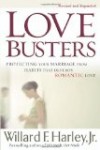Stay Informed
Popular Articles
- Hiatal Hernia: Hidden Cause of Chronic Illness
- Small Intestinal Bacterial Overgrowth (SIBO)
- Applied Lymphology: Unlocking the Secret to Pain Relief
- An Introduction to Constitutional Iridology
- The Low Down on Liver Detoxification
- An Energetic and Emotional Approach to Cancer
- Fat Facts
- Marrow in the Bones
- Blood Type and Nutrition
- Cardiac Herbs: Beyond Hawthorn
Quick Search
The School of Modern Herbal Medicine




Love Busters
- 8/19/2010
- Categorized in: Emotional Healing and Relationships

Love Busters by William F. Harley, Jr
Many years ago I learned the concept of "emotional bank accounts" from Stephen R. Covey. The idea is that whenever someone does something that makes us feel cared for (which involves fulfilling our deepest physical and emotional needs) they make a deposit to our emotional bank account.
When people make a lot of deposits to our emotional bank account we like being around them. If a person of the opposite sex makes enough deposits to our emotional bank account, we "fall in love" with them.
Dr. William F. Harley, Jr. is a marriage counselor who discovered that marriage counseling wasn't working. He was determined to develop a system of marriage counseling that would work, and did so. His system is based on this idea of emotional bank accounts. If couples do not regularly make deposits to each other's emotional bank accounts the love that exists in their relationship will disappear. This is covered in his books His Needs, Her Needs: Building an Affair-Proof Marriage and Fall in Love, Stay in Love.
Love Busters: Protecting Your Marriage from Habits That Destroy Romantic Love focuses on how we make "withdrawals" from other people's emotional bank accounts. Withdrawals are behaviors we do that hurt other people so that they don't want to be around us. It's really a book about how we "abuse" each other in relationships and why.
There are six love-busting habits that make serious withdrawals from the emotional bank accounts of other people that are covered in this book. They are selfish demands, annoying habits, angry outbursts, disrespectful judgments, independent behavoir and dishonesty. For each of these annoying habits, there are positive skills that can be developed to replace them. For instance, we can replace selfish demands with respectful requests.
As Dr. Harley points out in this book, love busters have no place in a loving relationship. They provide no benefits for us or others and are destructive to both self and others. Unfortunately, most of us are so used to love busting behaviors in relationships that we do not recongize them for what they are, and even if we do, we don't have the positive skills to replace them. This book helps you both recognize them and do something constructive instead.
Love Busters will not only help you have better relationships with a spouse or partner, it will also help you relate better with children, friends, co-workers, employees and other people. It will help you recognize when others are being abusive so you can stand up for yourself and help you recognize your own tendency to be abusive and change.
